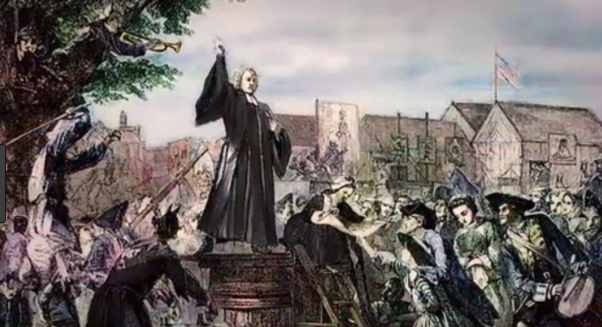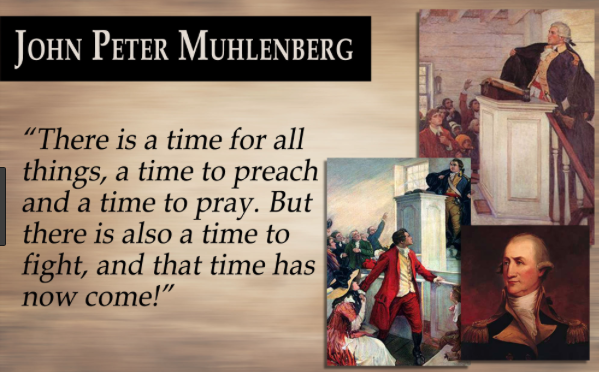
As a citizen of the United States of America, we celebrate Independence Day to remember the adoption of the Declaration of Independence on July 4th, 1776, which declared the 13 united colonies free from the King of Great Britain.
Last year I wrote the article Independence Day – What does freedom mean?. I explained the process of the adoption of the Declaration of Independence in 1776, what it meant for our founders to sign that document, along with the famous story of Nathan Hale. If you did not read the article I encourage you to read it.
Like last year, I would like to talk about a part of the United States history most Americans are not aware of.
The Black Robe Regiment
The Black Robed Regiment was a name given to the pastoral preachers in the 13 colonies before, during, and after the American Revolution. The British gave the name to the courageous and patriotic pastors during that time, referring to the black robes most of them wore. The British blamed the Black Robe Regiment for stirring up the teachings of civil governance from the Bible for American Independence. To support this claim, many historians agree all 27 grievances in the Declaration of Independence was first discussed and preached on by various pastors before 1763. (3)
Grievance is defined by the Oxford English Dictionary as “the infliction of wrong or hardship on a person (nation).” All of which were directed to King George III and British tyranny enforced on the colonies. As early as 1687, the Rev. John Wise was already teaching that “taxation without representation is tyranny,”(7) the “consent of the governed” was the foundation of government,(8) and that “every man must be acknowledged equal to every man.”(9) It is strange to think that the grievances listed in the Declaration of Independence were nothing more than a listing of sermon topics that was being preached on for decades leading up to the American Revolution.
American leaders also credited the Black Robe Regiment as most influential for American Independence. John Adams said, “the pulpits have thundered” (4) and identified several ministers as being among the “characters the most conspicuous, the most ardent, and influential” in the “awakening and a revival of American principles and feelings.” (5)
Stories you maybe didn’t know
Jonas Clark
When Paul Revere was making his famous ride through Lexington, Massachusetts yelling, “The British are coming! The British are coming!” he was headed for a specific house; the house of pastor Jonas Clark. Clark was a pastor in Lexington and after church, he and John Parker, a captain from the French Indian War, was organizing the Lexington men into a citizen army to fight the British if invaded. That night on April 18, 1775, Samuel Adams and John Hancock were hiding at Clark’s house. The British wanted to capture Adams’ and Hancock, and they found out where they were hiding.
As Revere rode up to the front yard of Clark’s home, Clark, Adams, and Hancock ran out to meet him. When they heard that the British were marching toward Lexington, Adams and Hancock asked pastor Clark if the men of Lexington would fight. Clark responded, “I trained them for this very hour; they would fight, and, if need be, die, too, under the shadow of the house of God.”
The next morning, Pastor Jonas Clark and Deacon John Parker led the Lexington Minutemen out to face the invaders. As the British approached the Minutemen, they cried out “in the name of the King of England throw down your arms!” This response rang out from the colonists, “We recognize no Sovereign but GOD and no King but JESUS!” Then Captain Parker said to his Minutemen, “Stand your ground, don’t fire unless fired upon. But if they mean to have a war, let it begin here.” Then the first shot rang out, the shot heard around the world.

John Muhlenberg
Sunday morning, Jan 21, 1776, pastor John Muhlenberg climbed into his pulpit in Woodstock, VA and gave his farewell sermon.
“The British have marched on our own city of Williamsburg, seizing our supply of gunpowder and munitions. Soldiers are entering private homes, homes just like ours…. ‘We are only farmers,’ you may
say. Patrick Henry has rallied five thousand men — farmers just like you — to fight back and drive the British out… Many of us came to this country to practice our religious freedoms. It is time to fight for those freedoms that we hold so dear… Let us pray. I am a clergyman, it is true. But I am also a patriot — and my liberty is as dear to me as to any man. Shall I hide behind my robes, sitting still at home, while others spill their blood to protect my freedom? Heaven forbid it! I am called by my country to its defense. The cause is just and noble. I am convinced it is my duty to obey that call, a duty I owe to my God and to my country. The Bible tells us there is a time for all things and there is a time to preach and a time to pray but the time for me to preach has passed away, and there is a time to fight, and that time has come now. Now is the time to fight! Call for recruits!”(6)
Then he did something his congregation did not expect. He removed his clerical robe revealing a colonial officer’s uniform beneath. Muhlenberg then stepped down from his pulpit and challenged the men of his congregation to join him in the fight for liberty. Bidding farewell to their families, some three hundred men rode away from Woodstock, VA with Col. John Muhlenberg in the lead to form the 8th Virginia regiment. Muhlenberg led those men throughout the American Revolution, fighting at the battles of Morristown, Brandywine, and Monmouth Courthouse. By the war’s end, Muhlenberg had been promoted to Major General and had become one of Washington’s most valued commanders. Muhlenberg was front and center at the surrender of Cornwallis at Yorktown.
James Caldwell
James Caldwell was pastor of the First Presbyterian Church in Elizabethtown, New Jersey. As a pastor standing for biblical truth in civil governance, he made himself many enemies. With the British wanting him dead he would step into his pulpit each Sunday wearing two pistols, placing one on the pulpit, and then proceeded to preach powerful sermons about the need for Christians to stand for truth. When the war began Caldwell became a chaplain in the colonial army. He was so hated by the British they gave him the nickname “Rebel Priest.”
Caldwell’s wife was killed by the British when they marched into Elizabethtown. By the time he had completed her funeral, the fighting had moved to Springfield, New Jersey so Caldwell rode there to join his men. Colonists were running out of wadding during the fight. Caldwell rode his horse to the First Presbyterian Church of Springfield and gathered up armloads of hymnals by Isaac Watts. He hurried back and threw the hymnals at the troop’s feet, commanding them to tear out the pages and use them for wadding. As he did so, he yelled, “Give’m Watts boys, give ’em Watts!” This is the origin of the famous phrase, “Give’m watt!”
Evergreen Takeaway
Our nation was brought together by the courageous and brave pastors living in the 17th & 18th centuries. The seeds of life, liberty, and private property was woven into the fabric of colonial America by pastors preaching biblical truth from the Geneva Bible, and the congregations of churches led the fight and formation of our Independence.
Happy Independence Day!
(1) – wallbuilders.com
(2) – nationalblackroberegiment.com
(3) – Alice M. Baldwin, The New England Clergy and the American Revolution (New York: Frederick Ungar, 1958), p. 170.
[4] – John Adams, The Works of John Adams, Charles Francis Adams, editor (Boston: Charles C. Little and James Brown, 1851), Vol. III, p. 476, “The Earl of Clarendon to William Pym,” January 20, 1766.
[5] – John Adams, The Works of John Adams, Charles Francis Adams, editor (Boston: Little, Brown and Company, 1850), Vol. X, p. 284, to Hezekiah Niles, February 13, 1818.
(6) – The Forgotten Heroes of Liberty, by Joel Tyler Headley
(7) Linda Stewart, “The Other Cape,” American Heritage (at: http://www.americanheritage.com/articles/magazine/ah/2001/2/2001_2_50.shtml) (accessed on September 24, 2010).
(8) Clinton Rossiter, Seedtime of the Republic (New York: Harcourt, Brace and Co., 1953), p. 219.
(9) “Top Ipswich Patriots by Thomas Franklin Waters & Mrs. Eunice Whitney Farley Felten,” Lord Family Album, 1927 (at:http://www.bwlord.com/Ipswich/Waters/TwoPatriots/JohnWise.htm).
Evergreen Wealth Management, LLC is a registered investment adviser. Information presented is for educational purposes only and does not intend to make an offer or solicitation for the sale or purchase of any specific securities, investments, or investment strategies. Investments involve risk and unless otherwise stated, are not guaranteed. Be sure to first consult with a qualified financial adviser and/or tax professional before implementing any strategy discussed herein. Past performance is not indicative of future performance.
